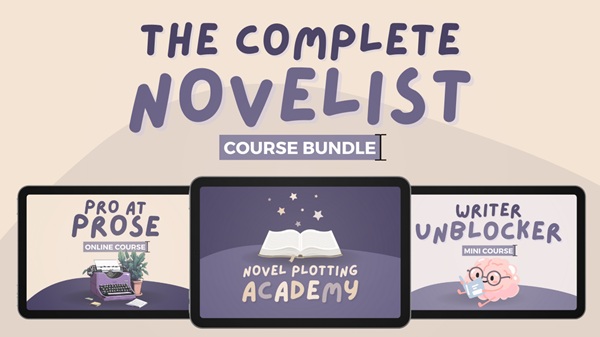No products in the cart.
[Group Buy] Charlie March – The Complete Novelist Course Bundle
$497.00 $29.00
[Group Buy] Charlie March – The Complete Novelist Course Bundle
- Payment method: I will send the payment link to your email.
- Deliver by: Google Drive, Mega.nz
Category: Marketing
Mastering the Art of Novel Writing with Charlie March – A Revolutionary Approach for Aspiring Authors
When it comes to transforming the often daunting journey of novel writing into an engaging and manageable adventure, few names stand out like Charlie March. As an accomplished literary editor, author, and founder of The Plottery, Charlie March exemplifies a unique philosophy that challenges traditional notions of writing being a painful or solitary struggle. Her innovative courses, such as the Complete Novelist Course, are designed not just to teach craft but to foster a genuine love for storytelling. With her blend of academic insight and practical experience, Charlie March has empowered countless writers to reframe their relationship with the craft, emphasizing clarity, character development, and mindset as the pillars of successful novel writing. Her teachings resonate deeply with anyone eager to craft compelling stories free from fear, self-doubt, and writerly blocks.
If you’re an aspiring writer seeking a comprehensive yet accessible pathway to completing your first novel, understanding Charlie March‘s methods offers an inspiring gateway. Her courses break down complex narrative concepts into engaging, interactive lessons that focus on building confidence while honing your craft. The Complete Novelist Course encapsulates her core philosophy—making the writing process joyful, character-driven, and goal-oriented. This approach has garnered glowing testimonials from writers who have achieved extraordinary results, from drafting their first story to publishing completed manuscripts. In this article, we explore Charlie March‘s unique offerings and philosophies, from thematic questions to practical tools like the pacing guide template, weaving together insights that can transform your writing journey into an enjoyable art form.
Table of Contents
Charlie March
Charlie March is more than just a course creator—she embodies a fresh perspective on the craft of writing. With a background that fuses academic training in filmmaking and creative writing with extensive practical experience, March’s approach is rooted in real-world success stories. Her journey from battling imposter syndrome to completing two full novel drafts in one year exemplifies her belief that writing isn’t inherently a struggle but can be a joyful exploration. As the founder of The Plottery, she has developed a suite of courses tailored to demystify the creative process, emphasizing that outline-building, prose crafting, and mindset mastery are interconnected skills. Her personal storytelling, honesty, and emphasis on character and theme over mere plot highlight her depth of understanding and her genuine desire to see writers succeed.
What sets Charlie March apart is her acknowledgment that psychological barriers—fear, procrastination, and perfectionism—are often the greatest hurdles. Her teaching philosophy focuses on overcoming these inner barriers through mindset shifts, thereby creating a sustainable, positive writing routine. Whether working one-on-one or guiding writers through comprehensive courses, Charlie March promotes the idea that writing should be as natural and joyful as childhood storytelling. Her emphasis on the character and thematic core as the foundation of storytelling offers a refreshing counterpoint to the “plot at all costs” mentality prevalent elsewhere. Her work serves as a reminder that powerful stories emerge from authentic voices, well-developed characters, and clear themes.
Complete Novelist Course
The Complete Novelist Course is the cornerstone of Charlie March’s offerings—a comprehensive training program that equips writers with all the tools necessary to finish a novel from conception to completion. Unlike traditional writing classes that often emphasize technique at the expense of process, this course stands out for its strategic focus on foundations draft guide and outline mastery. Developed with a clear structure and practicality in mind, the course guides beginners and intermediate writers alike through essential phases: developing compelling characters, understanding story pacing, and organizing narrative flow.
The course’s emphasis on creating a sample novel helps students test their skills in a simulated environment, reinforcing their understanding of story structure while encouraging creative freedom. Its modular design, accessible videos, and downloadable templates make the learning process engaging and adaptable for different writing styles. What truly distinguishes the Complete Novelist Course is its dedication to fostering an internal mindset of joy and confidence—transforming writing from a chore into a passion. This pedagogical shift, championed by Charlie March, aligns with her belief that success in writing hinges as much on mental resilience as on technical mastery. The course prepares writers not just to complete a manuscript but to embrace writing as a lifelong, rewarding endeavor.
Thematic Questions
One of the lesser-celebrated yet profoundly impactful aspects of Charlie March’s teaching philosophy revolves around thematic questions. These questions serve as a guiding compass, ensuring that stories are rooted in meaningful exploration rather than superficial plot twists. Thematic questions prompt writers to examine what their stories truly signify—what truths, conflicts, or questions they wish to explore. For example, a story might revolve around questions like “What does it mean to forgive oneself?” or “How does power corrupt good intentions?” Insights derived from these questions influence character arcs, dialogue, and plot development, making narratives resonate on a deeper level.
Incorporating thematic questions into the outline ensures the narrative remains focused and authentic. They act as a foundation for choosing what scenes, conflicts, and character revelations are essential. Moreover, such questions challenge writers to think critically about their story’s purpose, adding layers of depth often missing in first drafts. Charlie March advocates for this approach because it produces stories that are not merely entertaining but meaningful—resonating long after the reader has finished. This methodology invites writers to ask: Are my characters and plot advancing this core theme? What moral or philosophical questions am I exploring? These reflections elevate storytelling from a mechanical chore to an art of inquiry.
Pacing Guide Template
Story pacing is critical for maintaining reader engagement, and Charlie March’s courses thoughtfully incorporate tools like the pacing guide template—a practical resource designed to structure how story momentum unfolds. Pacing affects how tension is built and released, how emotional beats land, and whether the narrative flows naturally. The pacing guide template simplifies this process by helping writers plot out act breaks, key turning points, and climaxes in relation to character development and thematic exploration.
What makes this template particularly valuable is its flexibility; it encourages writers to adapt the pacing to their unique voice and story demands rather than rigid formulae. By mapping story beats visually, writers can identify lulls or pacing pitfalls early, ensuring that each chapter, scene, or act advances the story meaningfully. Charlie March emphasizes that understanding pacing is not just about suspense but about rhythm—how the emotional beats, revelations, and character transformations are spaced. When incorporated early in the writing process, the pacing guide template offers a roadmap that guides revisions, making the journey from draft to polished manuscript more efficient and satisfying. For aspiring novelists, mastering pacing with such tools fosters confidence in storytelling and a keen awareness of narrative flow.
Morally Grey Books
An intriguing aspect of Charlie March’s philosophy is her appreciation for morally grey books—stories that don’t shy away from complex characters or ambiguous moralities. Such stories challenge readers and writers alike by resisting black-and-white morality, instead embracing the contradictions and contradictions of human nature. For writers exploring this terrain, understanding how to build characters that are both relatable and morally nuanced is paramount.
Morally grey books demand a delicate balance; they require compelling internal conflicts, layered motivations, and dialogue that mirrors moral ambiguity. Charlie March encourages writers to ask themselves: How do my characters justify their actions? What moral dilemmas push them to the edge? In doing so, writers craft protagonists and antagonists who defy stereotypes, offering readers a more authentic and thought-provoking experience. Incorporating morally complex themes also enhances the thematic richness of a story, enabling it to explore societal issues or personal dilemmas with depth. Charlie March’s approach highlights that such stories, while challenging, can produce profound emotional responses and foster greater empathy—making them a vital part of contemporary fiction.
Sample Novel
Applying Charlie March’s principles often involves working through a sample novel—an exercise that helps writers embody her methodologies. Creating a sample novel from scratch, or revising an existing draft, allows writers to test their understanding of story structure, character development, and thematic clarity. This process underscores her belief that writing should be an enjoyable act of discovery and innovation rather than a taxing chore.
A sample novel also serves as a functional workshop—offering writers a tangible artifact to analyze or share with mentors, beta readers, or self-assessment tools. It becomes a living document where insights from thematic questions, pacing templates, and character arcs intertwine seamlessly. Importantly, development of a sample novel anchors the writer’s progress, transforming abstract skill-building into real-world achievement. Charlie March advocates for this approach as a form of experimentation—encouraging writers to embrace imperfection, learn through iteration, and ultimately produce stories that resonate authentically with their voice.
Foundations Draft Guide
Finally, the foundations draft guide exemplifies the core of Charlie March‘s teaching philosophy—focusing on the essentials needed to establish a strong story base. This guide directs writers through the initial stages of draft creation, emphasizing clarity around story core & foundation, character goals, and thematic alignment. It encourages writers to forge a resilient narrative skeleton before fleshing out scenes, dialogue, or prose.
What makes the foundations draft guide notable is its practicality: it provides actionable steps, downloadable checklists, and reflection prompts to ensure that writers remain aligned with their story’s purpose throughout the drafting process. This approach alleviates common pitfalls like wandering plotlines or inconsistent character motivation. By prioritizing the story core early, writers can avoid laborious revisions down the line, resulting in a more cohesive, compelling manuscript. Charlie March‘s emphasis on this foundational phase aims to empower writers to approach their craft methodically, turning what feels like an overwhelming task into a structured and achievable project.
Conclusion
The innovative methods pioneered by Charlie March exemplify a transformative shift in how writers approach the craft—placing joy, character depth, and mindset at the forefront rather than solely technical prowess. Her comprehensive courses like the Complete Novelist Course, supplemented by insights into thematic questions, the pacing guide template, and tools like the foundations draft guide, offer a holistic roadmap for aspiring authors. By emphasizing that storytelling stems from genuine human experiences and authentic character portrayals, Charlie March encourages writers to see themselves not just as crafters or technicians but as explorers of the human condition. Her teachings demonstrate that a well-rounded, mindset-driven approach can lead to fulfilling, successful writing careers that celebrate the creative process and produce stories that truly resonate. Through her mentorship and innovative tools, countless writers are discovering a new, joyful way to bring their stories to life—proof that writing, when approached with passion and purpose, can indeed be a deeply rewarding pursuit.
Sales Page: _https://www.the-plottery.com/courses
Delivery time: 12 -24hrs after purchased.
Be the first to review “[Group Buy] Charlie March – The Complete Novelist Course Bundle” Cancel reply
Related products
$20.99
$49.00
Sale!











Reviews
There are no reviews yet.